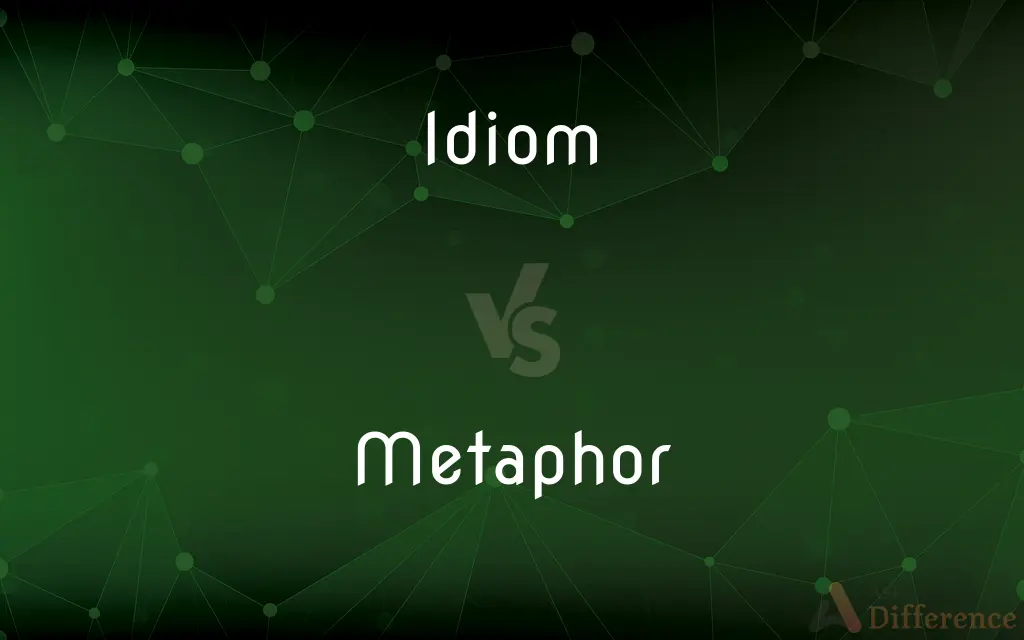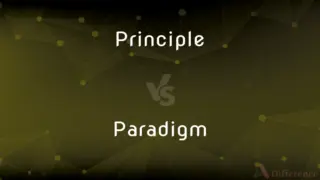Idiom vs. Metaphor — What's the Difference?
Edited by Tayyaba Rehman — By Fiza Rafique — Updated on October 30, 2023
Idioms are fixed expressions with non-literal meanings; metaphors make comparisons to convey a message or idea.

Difference Between Idiom and Metaphor
Table of Contents
ADVERTISEMENT
Key Differences
Idioms are phrases or expressions whose meanings aren't directly derived from the individual words within them. Metaphors, conversely, are figures of speech that convey a meaning by drawing a direct comparison between two unrelated things. For instance, the idiom "bite the bullet" doesn't literally involve biting a bullet but means to face a difficult situation. Meanwhile, a metaphor like "the world is a stage" doesn't mean the world is a literal stage but likens the world to a stage to express that life is full of performances.
In usage, idioms are often cultural and may not be easily understood by non-native speakers or those unfamiliar with the culture. Metaphors, on the other hand, might be better grasped because they rely on the broader human ability to understand and relate to comparisons. Consider the idiom "kick the bucket." Without prior knowledge, one might not infer its meaning (to die). A metaphor like "time is a thief" is more universally understood because it likens time to something that takes away, even without cultural context.
Functionally, idioms are generally static in their wording. Altering an idiom's words might render it meaningless. Metaphors can be more flexible. While the metaphor "drowning in sorrow" communicates deep sadness, one could also use "swamped in sorrow" or "sunk in sorrow" and still convey a similar sentiment.
To summarize, while both idioms and metaphors are used to convey meanings beyond the literal, idioms are fixed cultural expressions with non-literal interpretations, and metaphors draw comparisons between two things to convey a message or idea.
Comparison Chart
Definition
Fixed expressions with non-literal meanings.
Figures of speech comparing two unrelated things.
ADVERTISEMENT
Cultural Reliance
Often tied to specific cultures.
More universally understood.
Flexibility
Generally static in wording.
Can be altered while maintaining meaning.
Interpretation
Meaning isn't directly derived from its words.
Meaning is derived from the comparison made.
Example
"Kick the bucket" (to die).
"The world is a stage" (life as a performance).
Compare with Definitions
Idiom
They are established groups of words conveying a figurative meaning.
They decided to bury the hatchet and become friends again.
Metaphor
A metaphor is a figure of speech that likens one thing to another.
His words were a breath of fresh air.
Idiom
Idioms are speech forms or expressions of a given language.
She wanted to test the waters before making a decision.
Metaphor
Metaphors make direct comparisons between unrelated things.
She's the apple of his eye.
Idiom
Idioms are fixed phrases with a meaning not deducible from its words.
She's over the moon about her promotion.
Metaphor
They are used to convey a deeper meaning or message.
Her voice is music to my ears.
Idiom
An idiom's meaning is often different from its literal interpretation.
I guess we'll just cross that bridge when we come to it.
Metaphor
Metaphors express a resemblance or analogy between entities.
Laughter is the best medicine.
Idiom
An idiom is a phrase or expression that typically presents a figurative, non-literal meaning attached to the phrase; but some phrases become figurative idioms while retaining the literal meaning of the phrase. Categorized as formulaic language, an idiom's figurative meaning is different from the literal meaning.
Metaphor
They offer a symbolic representation of something else.
The world's events are but sands in the hourglass of time.
Idiom
A group of words established by usage as having a meaning not deducible from those of the individual words (e.g. over the moon, see the light).
Metaphor
A metaphor is a figure of speech that, for rhetorical effect, directly refers to one thing by mentioning another. It may provide (or obscure) clarity or identify hidden similarities between two different ideas.
Idiom
A characteristic mode of expression in music or art
They were both working in a neo-impressionist idiom
Metaphor
A figure of speech in which a word or phrase is applied to an object or action to which it is not literally applicable
Her poetry depends on suggestion and metaphor
When we speak of gene maps and gene mapping, we use a cartographic metaphor
Idiom
A speech form or an expression of a given language that is peculiar to itself grammatically or cannot be understood from the individual meanings of its elements, as in keep tabs on.
Metaphor
A figure of speech in which a word or phrase that ordinarily designates one thing is used to designate another, thus making an implicit comparison, as in "a sea of troubles" or "All the world's a stage" (Shakespeare).
Idiom
The specific grammatical, syntactic, and structural character of a given language.
Metaphor
One thing conceived as representing another; a symbol
"Hollywood has always been an irresistible, prefabricated metaphor for the crass, the materialistic, the shallow, and the craven" (Neal Gabler).
Idiom
Regional speech or dialect.
Metaphor
The use of a word or phrase to refer to something other than its literal meaning, invoking an implicit similarity between the thing described and what is denoted by the word or phrase.
Idiom
A specialized vocabulary used by a group of people; jargon
Legal idiom.
Metaphor
A word or phrase used in such implied comparison.
Idiom
A style of artistic expression characteristic of a particular individual, school, period, or medium
The idiom of the French impressionists.
The punk rock idiom.
Metaphor
The use of an everyday object or concept to represent an underlying facet of the computer and thus aid users in performing tasks.
Desktop metaphor; wastebasket metaphor
Idiom
A manner of speaking, a mode of expression peculiar to a language, language family, or group of people.
In English, idiom requires the indefinite article in a phrase such as "she's an engineer", whereas in Spanish, idiom forbids it.
Some of the usage prescriptions improved clarity and were kept; others that yielded discordant violations of idiom were eventually revised.
Metaphor
(intransitive) To use a metaphor.
Idiom
(programming) A programming construct or phraseology that is characteristic of the language.
Metaphor
(transitive) To describe by means of a metaphor.
Idiom
A language or language variety; specifically, a restricted dialect used in a given historical period, context etc.
In the idiom of the day, they were sutlers, although today they'd probably be called vendors.
Metaphor
The transference of the relation between one set of objects to another set for the purpose of brief explanation; a compressed simile; e. g., the ship plows the sea.
Idiom
An established phrasal expression whose meaning may not be deducible from the literal meanings of its component words.
She often spoke in idioms, pining for salad days and complaining about pots calling the kettle black.
Metaphor
A figure of speech in which an expression is used to refer to something that it does not literally denote in order to suggest a similarity
Idiom
An artistic style (for example, in art, architecture, or music); an instance of such a style.
The idiom of the expressionists
Idiom
The syntactical or structural form peculiar to any language; the genius or cast of a language.
Idiom may be employed loosely and figuratively as a synonym of language or dialect, but in its proper sense it signifies the totality of the general rules of construction which characterize the syntax of a particular language and distinguish it from other tongues.
By idiom is meant the use of words which is peculiar to a particular language.
He followed their language [the Latin], but did not comply with the idiom of ours.
Idiom
An expression conforming or appropriate to the peculiar structural form of a language.
Some that with care true eloquence shall teach,And to just idioms fix our doubtful speech.
Idiom
A combination of words having a meaning peculiar to itself and not predictable as a combination of the meanings of the individual words, but sanctioned by usage; as, an idiomatic expression; less commonly, a single word used in a peculiar sense.
It is not by means of rules that such idioms as the following are made current: "I can make nothing of it." "He treats his subject home." Dryden. "It is that within us that makes for righteousness." M. Arnold.
Sometimes we identify the words with the object - though by courtesy of idiom rather than in strict propriety of language.
Idiom
The phrase forms peculiar to a particular author; as, written in his own idiom.
Every good writer has much idiom.
Idiom
Dialect; a variant form of a language.
Idiom
A manner of speaking that is natural to native speakers of a language
Idiom
The usage or vocabulary that is characteristic of a specific group of people;
The immigrants spoke an odd dialect of English
He has a strong German accent
Idiom
The style of a particular artist or school or movement;
An imaginative orchestral idiom
Idiom
An expression whose meanings cannot be inferred from the meanings of the words that make it up
Idiom
Idioms are cultural expressions with non-literal interpretations.
He hit the nail on the head with that explanation.
Common Curiosities
Are metaphors tied to specific cultures like idioms?
While metaphors can have cultural nuances, they're often more universally understood than idioms.
Why are idioms often confusing to language learners?
Idioms often have meanings that aren't directly derived from their words, making them challenging for learners without cultural context.
How does a metaphor differ from an idiom?
A metaphor draws a comparison between two unrelated things, while an idiom is a fixed expression with a non-literal meaning.
Can idioms be easily understood by everyone?
Idioms often require cultural context for understanding, so they might not be easily grasped by everyone.
What is an idiom?
An idiom is a fixed expression with a meaning not directly derived from its individual words.
Can you change the words in an idiom and keep its meaning?
Typically, no. Altering the words of an idiom can change or lose its meaning.
Can metaphors vary in their wording?
Yes, metaphors can be reworded and still convey a similar sentiment.
Why are metaphors used in literature?
Metaphors can add depth, create imagery, and convey deeper meanings or emotions in literature.
Why are idioms and metaphors important in language?
They enrich language, add color to expressions, and convey deeper emotions, thoughts, or cultural nuances.
Are all idioms metaphors?
No, while some idioms might be metaphoric, not all are metaphors.
Is a metaphor a direct comparison?
Yes, a metaphor directly likens one thing to another without using "like" or "as."
Are idioms always figurative in meaning?
Yes, idioms convey meanings beyond their literal interpretations.
Can an idiom be translated directly into another language and retain its meaning?
Often, direct translations of idioms don't retain their original meaning due to cultural differences.
Can a phrase be both an idiom and a metaphor?
Yes, some phrases can function as both, such as "drowning in debt."
What's the difference between a metaphor and a simile?
A metaphor directly compares two things, while a simile uses "like" or "as" for the comparison.
Share Your Discovery

Previous Comparison
Principle vs. Paradigm
Next Comparison
Bipartisan vs. PartisanAuthor Spotlight
Written by
Fiza RafiqueFiza Rafique is a skilled content writer at AskDifference.com, where she meticulously refines and enhances written pieces. Drawing from her vast editorial expertise, Fiza ensures clarity, accuracy, and precision in every article. Passionate about language, she continually seeks to elevate the quality of content for readers worldwide.
Edited by
Tayyaba RehmanTayyaba Rehman is a distinguished writer, currently serving as a primary contributor to askdifference.com. As a researcher in semantics and etymology, Tayyaba's passion for the complexity of languages and their distinctions has found a perfect home on the platform. Tayyaba delves into the intricacies of language, distinguishing between commonly confused words and phrases, thereby providing clarity for readers worldwide.














































